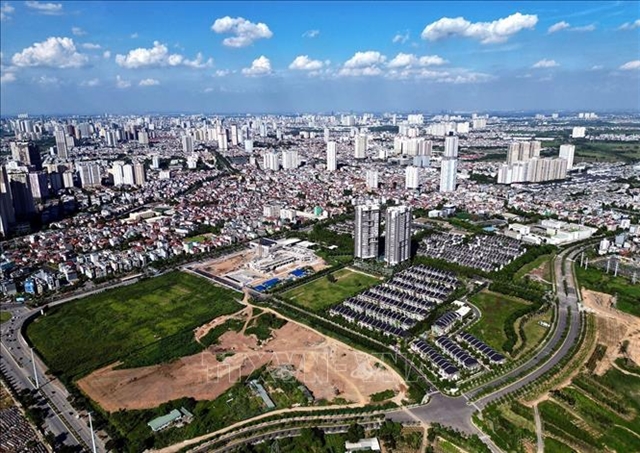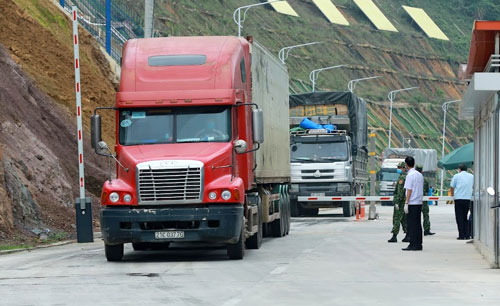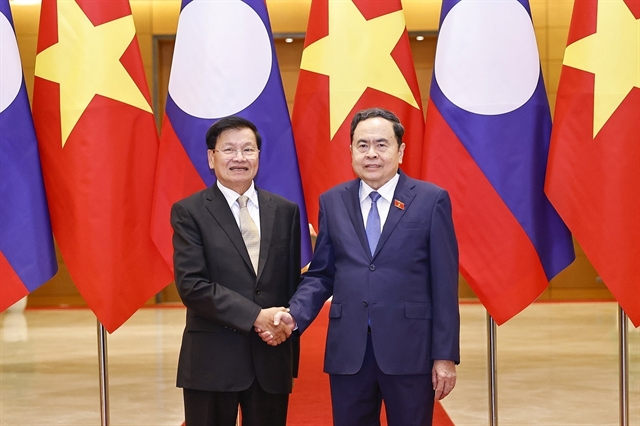 Economy
Economy


|
| The volume of Vietnamese export goods with customs clearance each day at border gates with China is limited due to China's stricter disease preventive measures. Photo nld.com.vn |
HÀ NỘI — Ministries are strengthening cooperation with each other and with Chinese counterparts to solve difficulties in exporting agricultural products at the country's border gates.
Since August 18, China has upgraded the COVID-19 pandemic preventive measures for goods exported from Việt Nam to China, significantly changing the process of transporting export goods at border gates between the two countries, according to the Ministry of Industry and Trade (MoIT).
Accordingly, China does not allow Vietnamese drivers and goods owners to enter this country's border gate areas. Chinese drivers will receive the trucks transporting Việt Nam’s export goods at the Pochai border gate area. After the goods are unloaded from the trucks, Chinese drivers will return those vehicles to Vietnamese drivers at the border gate area.
As a result, there are hundreds of trucks transporting Vietnamese goods and agricultural products at Lạng Sơn Province’s border gates waiting to be exported to China, the Người Lao động (Labourer) newspaper reported.
The Lạng Sơn Customs Department said the customs clearance for Vietnamese export agricultural products and fresh fruits has been implemented slowly due to many procedures and strict regulations on pandemic prevention set out by China.
From August 18 to August 23, the Tân Thanh customs office carried out customs clearance procedures for nearly 900 trucks of agricultural products.
Meanwhile, at the Hữu Nghị international border gate, the volume of goods passing customs clearance each day is limited due to the stricter preventive measures.
Nguyễn Hữu Vượng, Deputy Director of Lạng Sơn Customs Department, said with this situation, border-gate customs offices prioritise trucks carrying fresh fruits and farm produce to perform customs clearance in the morning.
"The priority will avoid incurring time and costs and minimise damage to enterprises," Vượng said.
In order to remove those difficulties, deputy minister of Industry and Trade Trần Quốc Khánh said Lạng Sơn Province has asked to review and improve further processes of transport and customs clearance for goods at border gates, ensuring pandemic prevention and control measures but not causing obstacles for import and export activities.
MoIT leaders have also worked with the Chinese Embassy in Việt Nam to seek solutions on removing those difficulties for export agricultural products at the northern border gates.
At the same time, Minister of Industry and Trade Nguyễn Hồng Diên sent a letter to the Minister of Commerce of China and the authorities of Yunnan Province (China) proposing to facilitate customs clearance for Vietnamese agricultural products and fruits exported to China.
The People's Committee of Lạng Sơn Province needs to closely coordinate with the ministry in discussing with the Chinese side to change the strict measures that are causing obstacles for trade activities between the two countries.
In the long term, the MoIT encourages local businesses to shift their export activities to the Chinese market to the official form and only transport goods to the border when they have agreements with buyers.
The enterprises also need to implement import markets’ standards on quality, food safety, traceability and growing area codes in the production of farm produce. That will help speed up the customs clearance process, according to the ministry.
Meanwhile, the Ministry of Agriculture and Rural Development (MARD) and the Ministry of Foreign Affairs (MoFA) would work to solve this problem in meetings with China in the near future.
This proposal was offered by Deputy Minister of Agriculture and Rural Development Lê Quốc Doanh last week at a meeting with Deputy Minister of Foreign Affairs Nguyễn Minh Vũ on the agricultural cooperation between Việt Nam and China. It aimed at preparing for the upcoming meeting of the Việt Nam - China Bilateral Cooperation Steering Committee.
According to Deputy Minister Doanh, China has a large demand for Vietnamese farm produce as Việt Nam has abundant tropical agricultural products. However, the current biggest obstacle in exporting those products to China is that China often changes its border policy.
Deputy Minister Vũ said MoFA would work with the Chinese side to remove this obstacle, creating favourable conditions for Vietnamese agricultural products.
Vũ was quoted by the Nông thôn ngày nay (Countryside Today) newspaper as saying that "the MoFA will strengthen coordination with the MARD to facilite further export of Vietnamese agricultural products to China.”
Innitially, the two ministries will promote information exchange and have specific recommendations on this issue. They will also strengthen connection to increase the efficiency of solving problems in trade activities.
Vũ said in the current economic situation, agriculture continues to be an important pillar of the economy, not only meeting domestic consumption but also completing export goals. Of which, China is a potential market for Vietnamse farm produce. — VNS





 Brandinfo
Brandinfo